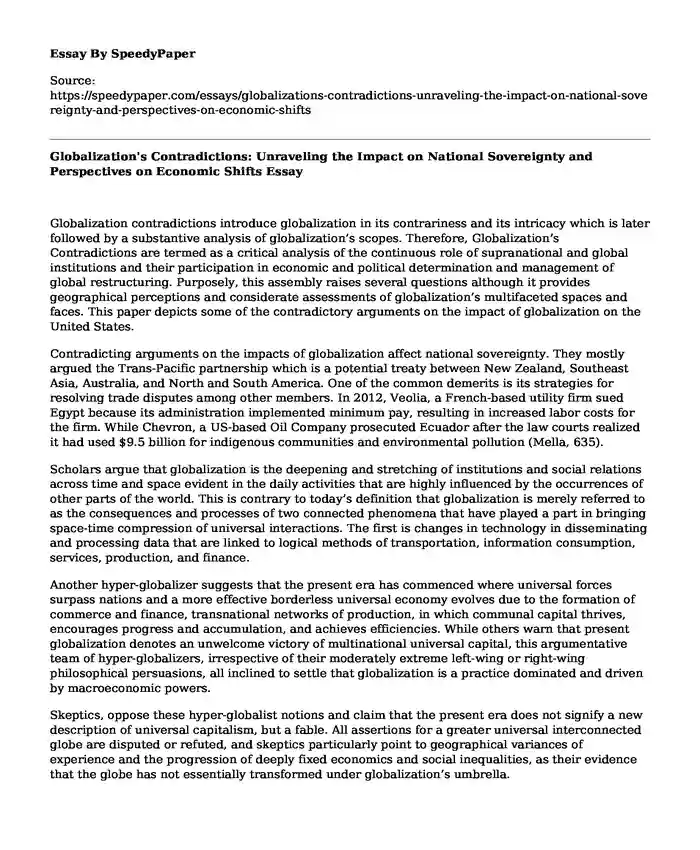
| Type of paper: | Essay |
| Categories: | Globalization Economics Finance |
| Pages: | 3 |
| Wordcount: | 691 words |
Globalization contradictions introduce globalization in its contrariness and its intricacy which is later followed by a substantive analysis of globalization’s scopes. Therefore, Globalization’s Contradictions are termed as a critical analysis of the continuous role of supranational and global institutions and their participation in economic and political determination and management of global restructuring. Purposely, this assembly raises several questions although it provides geographical perceptions and considerate assessments of globalization’s multifaceted spaces and faces. This paper depicts some of the contradictory arguments on the impact of globalization on the United States.
Contradicting arguments on the impacts of globalization affect national sovereignty. They mostly argued the Trans-Pacific partnership which is a potential treaty between New Zealand, Southeast Asia, Australia, and North and South America. One of the common demerits is its strategies for resolving trade disputes among other members. In 2012, Veolia, a French-based utility firm sued Egypt because its administration implemented minimum pay, resulting in increased labor costs for the firm. While Chevron, a US-based Oil Company prosecuted Ecuador after the law courts realized it had used $9.5 billion for indigenous communities and environmental pollution (Mella, 635).
Scholars argue that globalization is the deepening and stretching of institutions and social relations across time and space evident in the daily activities that are highly influenced by the occurrences of other parts of the world. This is contrary to today’s definition that globalization is merely referred to as the consequences and processes of two connected phenomena that have played a part in bringing space-time compression of universal interactions. The first is changes in technology in disseminating and processing data that are linked to logical methods of transportation, information consumption, services, production, and finance.
Another hyper-globalizer suggests that the present era has commenced where universal forces surpass nations and a more effective borderless universal economy evolves due to the formation of commerce and finance, transnational networks of production, in which communal capital thrives, encourages progress and accumulation, and achieves efficiencies. While others warn that present globalization denotes an unwelcome victory of multinational universal capital, this argumentative team of hyper-globalizers, irrespective of their moderately extreme left-wing or right-wing philosophical persuasions, all inclined to settle that globalization is a practice dominated and driven by macroeconomic powers.
Skeptics, oppose these hyper-globalist notions and claim that the present era does not signify a new description of universal capitalism, but a fable. All assertions for a greater universal interconnected globe are disputed or refuted, and skeptics particularly point to geographical variances of experience and the progression of deeply fixed economics and social inequalities, as their evidence that the globe has not essentially transformed under globalization’s umbrella.
Other transformations suggested that globalization is an exceptional major power causing political economic and social reformation (Dunne, Timothy & Christian). The local-foreign frontier is an escalating set of intertwined cosmoses of exchange and interchange, stating that globalization is not only weakening the power of national administrations but also in statistics, helping to restructure and reconstitute civil influence and power, as adaptations to the escalating intricacy of international regulation, governance and universal consensus-building in the linked world.
While history has portrayed some arguments, their fears might not have been properly founded. Although globalization is regarded as bad due to its constituent elements, it leads to an increase in unemployment amid a universal workforce. According to the Bureau of Labor Statistics, in 1960, 24% of US employees were working in manufacturing companies. After the initiation of North American Free trade in 1994, these workers lost close to 5 million manufacturing careers (Stanford).
Conclusion
In conclusion, globalization is not a bad term. Moreover, protectionist strategies are not the solutions to all the cases and it’s, therefore, essential to question whether certain trade treaties, observed holistically, will impose more damage than good.
Works Cited
Dunne, Timothy, and Christian Reus-Smit, eds. The globalization of international society. Oxford University Press, 2017.
Mella, Rodrigo A. "The Enforcement of Foreign Judgments in the United States: The Chevron Corp. v. Donziger Case." NYUJ Int'l L. & Pol. 49 (2016): 635.
Stanford, Jim. "North American free trade: history, structure and prospects." The Handbook of Globalisation, Third Edition. Edward Elgar Publishing, 2019.
Cite this page
Globalization's Contradictions: Unraveling the Impact on National Sovereignty and Perspectives on Economic Shifts. (2024, Jan 19). Retrieved from https://speedypaper.com/essays/globalizations-contradictions-unraveling-the-impact-on-national-sovereignty-and-perspectives-on-economic-shifts
Request Removal
If you are the original author of this essay and no longer wish to have it published on the SpeedyPaper website, please click below to request its removal:
- Essay Sample on The Wells Fargo Case
- Free Essay Sample about Traveling
- Why Are Internal Audits Important? Essay Example
- Fire in Bangladesh's Capital - Paper Example
- Essay Sample on Short-Term Investment Returns: Money Market Instruments
- COVID-19 Impact on Tourism: A Segmentation Analysis - Essay Sample
- Paper Example on Financial Lessons in the Book Rich Dad Poor Dad
Popular categories




